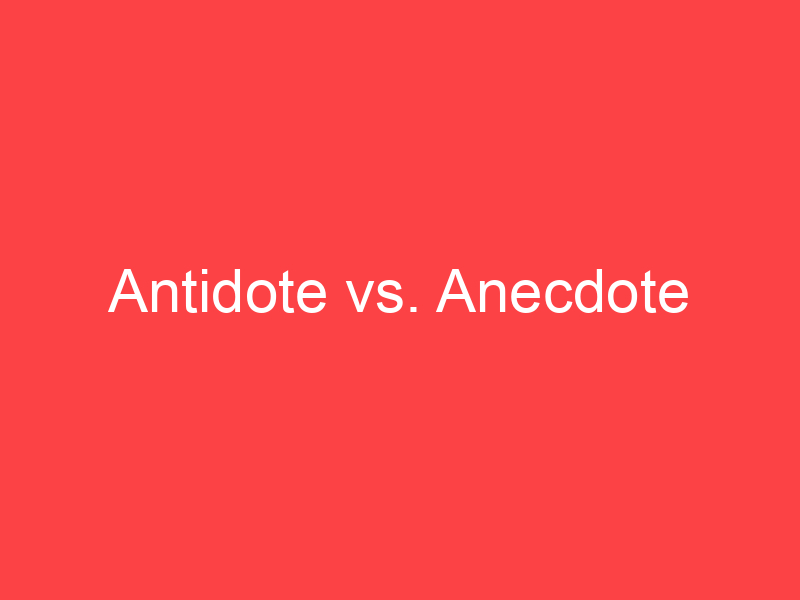Main Difference
The main difference between Antidote and Anecdote is that the Antidote is a substance which counteracts poisoning and Anecdote is a remarkable or characteristic story.
-
Antidote
An antidote is a substance that can counteract a form of poisoning. The term ultimately derives from the Greek term φάρμακον ἀντίδοτον (pharmakon) antidoton, “(medicine) given as a remedy”. Antidotes for anticoagulants are sometimes referred to as reversal agents.The antidotes for some particular toxins are manufactured by injecting the toxin into an animal in small doses and extracting the resulting antibodies from the host animals’ blood. This results in an antivenom that can be used to counteract venom produced by certain species of snakes, spiders, and other venomous animals. Some animal venoms, especially those produced by arthropods (e.g., certain spiders, scorpions, bees, etc.) are only potentially lethal when they provoke allergic reactions and induce anaphylactic shock; as such, there is no “antidote” for these venoms because it is not a form of poisoning and anaphylactic shock can be treated (e.g., by the use of epinephrine).
Some other toxins have no known antidote. For example, the poison aconitine – a highly poisonous alkaloid derived from various aconite species – has no antidote, and as a result, is often fatal if it enters the human body in sufficient quantities.
-
Anecdote
An anecdote is a brief, revealing account of an individual person or an incident: “a story with a point,” such as to communicate an abstract idea about a person, place, or thing through the concrete details of a short narrative or to characterize by delineating a specific quirk or trait. Occasionally humorous, anecdotes differ from jokes because their primary purpose is not simply to provoke laughter but to reveal a truth more general than the brief tale itself.
Anecdotes may be real or fictional; the anecdotal digression is a common feature of literary works and even oral anecdotes typically involve subtle exaggeration and dramatic shape designed to entertain the listener. An anecdote is always presented as the recounting of a real incident involving actual persons and usually in an identifiable place. In the words of Jürgen Hein, they exhibit “a special realism” and “a claimed historical dimension.”
-
Antidote (noun)
A remedy to counteract the effects of poison (often followed by “against,” “for,” or “to”).
“She reached the hospital in time to receive the antidote for the snake venom.”
-
Antidote (noun)
Something that counteracts or prevents something harmful.
“We need an antidote for this misinformation.”
-
Antidote (verb)
To counteract as an antidote.
-
Anecdote (noun)
A short account of a real incident or person, often humorous or interesting.
-
Anecdote (noun)
An account which supports an argument, but which is not supported by scientific or statistical analysis.
-
Anecdote (noun)
A previously untold secret account of an incident.
-
Antidote (noun)
a medicine taken or given to counteract a particular poison
“there is no known antidote to the poison of the pufferfish”
-
Antidote (noun)
something that counteracts an unpleasant feeling or situation
“laughter is a good antidote to stress”
-
Anecdote (noun)
a short amusing or interesting story about a real incident or person
“he told anecdotes about his job”
-
Anecdote (noun)
an account regarded as unreliable or hearsay
“his wife’s death has long been the subject of rumour and anecdote”
-
Anecdote (noun)
the depiction of a minor narrative incident in a painting
“the use of inversions of hierarchy, anecdote, and paradox by Magritte, Dali, and others”

